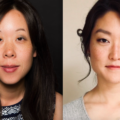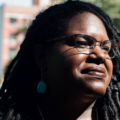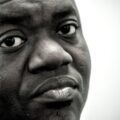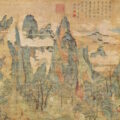A River That Flows Toward the Future: The New-Generation African Poets

The New-Generation African Poets: A Chapbook Box Set (Akashic Books, 2018) is a work of art as well as a labor of love. Editors Kwame Dawes and Chris Abani midwifed the project, which consists of eleven slender chapbooks accompanied by an introductory volume, all neatly packed in a handsome slipcase. Abani speaks of gleaning. He and Dawes have performed a remarkable task here, gleaning this season’s harvest of gifted poets and presenting their words to the world. Dawes identifies movement as the recurring theme that connects most of the emerging poets in this collection: “I kept being drawn back to the idea of border crossings, of movement, and in many instances, of migration.”
Movement frequently manifests in the imagery of water. “As we say in my small town of origin, Afikpo,” Abani notes, “language is a river that flows toward the future carrying the knowledge of before into the possibility of now.” It certainly flows through the riveting prose poems of Henneh Kyereh Kwaku’s Revolution of the Scavengers, in which Kwaku laments the mismanagement and corruption that plague his beloved Ghana: “…in Hohoe, water is scarce. If I do not fill my barrels on Monday, I’ll have no water, no water till Thursday & this isn’t a metaphor—” Pouring rain later becomes metaphor, takes on an altogether different valence in the poem “Kutsiami”: “There are no ferrymen on floods. Death’s linguist, will you hear us if we come bloating—floating—on water?”
In the accessible language and heart-rending images of Sadia Hassan’s Enumeration, rain represents the invasion of the flesh. “For months it does not rain, / and then after the breaking— / after his friend forces his way in to my / room, on my bed, between myself and / myself—it rains. A rain black with flies…” Hassan, who grew up in Atlanta, Georgia, writes about Somalia, dedicating her poem “What the Living Do” to fellow Somali poet Jamila Osman. The poem is an elegy to the young sisters both women lost. “…a rain that promised / nothing: no death of baby sisters, no car crashes, no love songs / no one will dance to at weddings we cannot attend because / once dead, there is no ever after.” Grief also saturates the work of Ghanaian Tryphena Yeboah in A Mouthful of Home. In “My Body, Having Learned Resurrection,” the speaker tells us: “I’m versed inside a language that demands that before I speak, / I weigh the words on my tongue. Must be salt, must be water.” In a meditation about her father’s death, she writes: “…I wake up, numb to everything. I know the end of me is here when I can’t feel the wind on my face. I keep the doors locked, the windows shut. God is still God but I will not look at the sky today.” And in the wrenching poem, “Reporting Abuse,” she asks: “What do I do with my rape? / I keep it warm, under blankets. I hide every sharp object and / when I’m with a man, my body turns to water that can drown both of us.” Every poignant poem is sheathed in such evocative language.
Jamila Osman, a former public school teacher who’s now an MFA candidate at the University of Iowa, is no stranger to such sorrow. In A Girl Is a Sovereign State, she writes of the brutality of men: “Oh, female of the human species, / you need no convincing of the cruelty / of the hunter’s hands”. More than once she speaks of the barrier and fluidity of language, as in her stunning poem “English Lessons”: “Silence was my first language. / I am fluent in its cadences. / I know quiet is a celebration, the way it pours out of a mouth. / A rush of water in a season of drought.” Sorrow likewise dominates Notes On Resilience, by Safia Jama, who writes: “Mother makes lemon meringue / separating yolk from egg white / the way ocean religion melanin / keep me from my kin.” The spacing between the words indicates the chasm that separates her Irish-American mother’s family from her Somali father’s family. In the wrenching “Dad’s Last Visit” she describes a toy castle graced by a Somali flag attached to a spring pole with a pink barrette. “Dad jokes, / If the president of Somaliland saw that, I’d be fired. / Silently, I hope he does get fired. / I miss him.”
Psalm for Chrysanthemums, by South African poet Nkateko Masinga,wrestles with dark topics as well—depression, self-mutilation, suicide. In “Inpatient,” she cries out: “In the numbness, / the unbearable cold / when I reached for sharp objects / and leaned towards steep inclines / to feel something, anything…” Masinga’s poems manifest the presence of a disembodied soul, with her impeccable diction and analytical manner contributing to the sense of alienation. Afua Ansong writes about Ghana in Try Kissing God, delving into mythology and Akan symbols (West African pictographs). Perhaps because most of Ansong’s poems are written in the second person, they have a distancing quality similar to that of Masinga. “TAMFO BEBRE: The enemy will suffer,” begins: “In your dreams, the devil recites at the waist of a river. / His stanzas touch you. You eat his words and they almost / choke you as you swallow. The words digest and you / watch the talons of an eagle grow from your toenails.”
From Kenya comes the strong, original voice of Michelle K. Angwenyi. Gray Latitudes, the title of her chapbook, refers to “…what’s outside the window, in every shap-/ ing of its frame, has also been looking in. Monuments: real, / imagined—and alltheir gray latitudes“. The artwork on the cover of her chapbook consists of horizontal black lines printed over an abstract image, evoking the flattened landscape she describes as well as the excising strokes of censorship (for things unspoken or forbidden). Of paramount importance to her is the written word on a page. “…lined paper written over on both sides. folded, / and re-folded, falling apart into history”. The poem ends with these lines: “…we come together once more, unscripted, / everywhere at once, misting through words, asking after each other, as if / in search of suture, only to erase, glide across paper, rewrite—(i speak of / letters, i speak in them).” The blue background on the cover may reflect the “blue anger” in her lyrical yet hatchet-sharp verse and prose.
In The Origin of Name, Nigerian poet Adedayo Adeyemi Agarau blames the gods for being cruel and manipulative. He targets the deity of war: “Ogun’s body is made of machetes, so it cuts this child / the way a knife cuts a dog, cuts his mother and / plucks every laughter from this house.” The battlefield language projects vivid, lingering images. His poem “A Child Whose Cry at Birth Suggests Distress” begins with, “I say I come from a city where we wash our wounds with salt, / where we give every sore a new name just so they feel new.”
Egyptian-born Nadra Mabrouk writes canticles that honor her heritage in Measurement of Holy, beautifully capturing the past in frozen moments. The last poem, “The Prophecy,” begins, “Do you remember July last year in the middle / of the field, warmth hailing from the oak tree, / your face shadowed by the ash pirouetting / from the grave ride suspended above us?” and ends with, “I told you what we needed, told you we would never forget.” In “The Condition” she uses the voice of her mother: “…even if, even while, / the world ends around you, / earth tearing root by root, /…If there is a seed / in your palm, / you must bend to the soil / and plant it.”
Fatima Camara, a writer and spoken word artist from Minneapolis, Minnesota, searches for identity in her collection, YellowLine. She explores the need to belong and flirts with the idea of suicide. In “With Time” she states, “I’m not suicidal. / Some days, I’m fucking happy. / On the days that I’m not, / Language fails me.” The fear of loss weaves through the lyrical narratives, loss of family members, loss of words, loss of life and particularly the loss of self. A reminder of trauma follows expressions of joy, as in “Sanno,” which begins with, “Look! The beauty of the waves. / I close my eyes and cringe to hear the death in each crash.”
The emerging African poets in this chapbook collection do not write about acres of daffodils swaying in the breeze or thin-waisted ladies with faces wherein all pleasant things do grow. They speak of parched roots and ungloved hands churning the earth. They write about wounds and scars. Their work is wrenching and vibrant, and above all, their writing is truthful and clear-eyed. New-Generation African Poets: A Chapbook Box Set (Saba) is an intellectual, emotional, and aesthetic watershed, a flood that will nourish poets for a generation.
About
Claire Hsu Accomando was born in Switzerland to a Chinese father and a French-Armenian mother. She graduated from NYU with a degree in biology but preferred literature to science. Her poems have appeared in Atlanta Review, California Quarterly, San Diego Reader, Mudfish, Perigee, San Diego Writers Ink, The San Diego Poetry Annual, and Magee Park Poets Anthologies. Claire was awarded first prize for poetry at the Santa Barbara Writers Conference and first prize for poetry chapbook by the San Diego Book Awards Association. Her memoir, Love and Rutabaga (St. Martin's Press), has just been published in France by L'Harmattan. Other non-fiction works include publications in Women in World History, The Christian Science Monitor, American History Magazine, Ararat, Artweek, Promising Practices, and other magazines.





